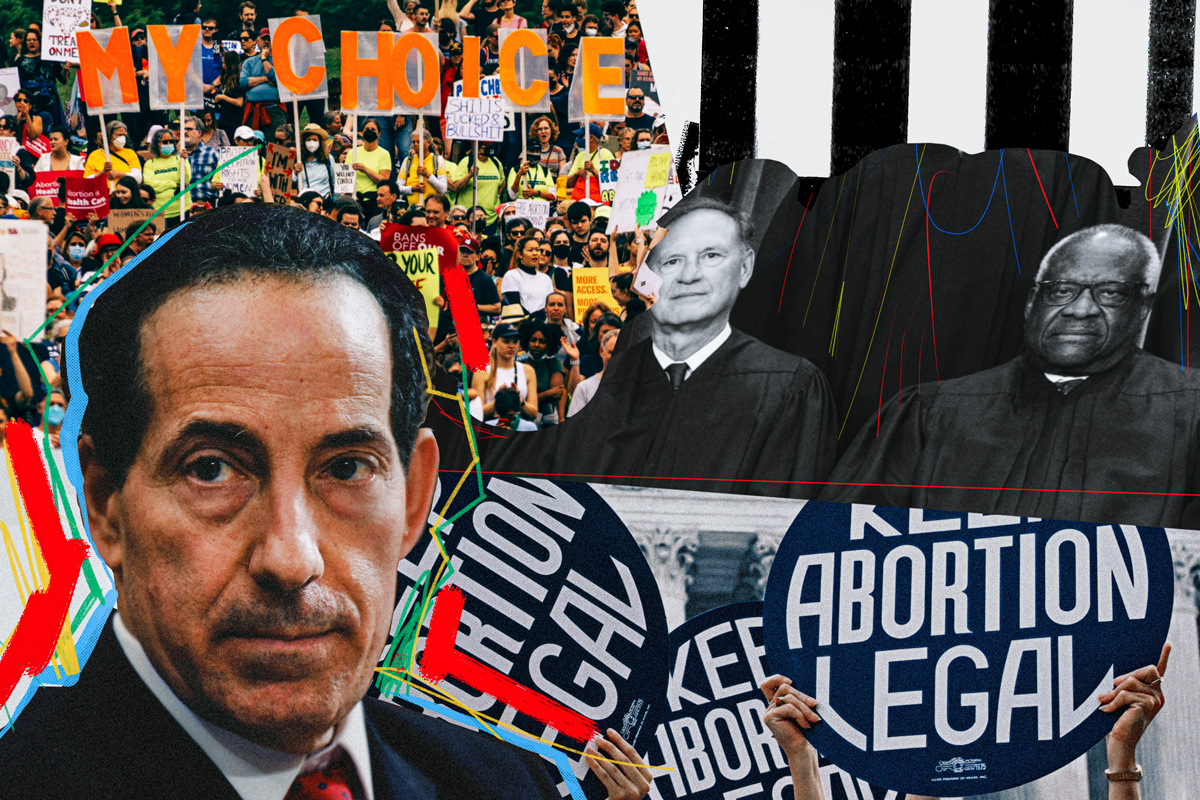Democratic Rep. Jamie Raskin represents Maryland’s eighth congressional district, but in another sense, he’s the democracy-at-large member of Congress. He’s helped craft legislation to repair the basic foundations of representative democracy, and to codify reproductive rights now imperiled by the U.S. Supreme Court. He’s also recently held hearings to face down the state level gag-orders banning honest discussion of our racial past in American classrooms. Raskin is best known for serving as the House manager of former President Donald Trump’s second impeachment, for Trump’s role in fomenting the insurrection at the U.S. Capitol on January 6, 2021. He is now a select member of the House subcommittee investigating the uprising, which he candidly describes as an attempted coup from the right.
The Forum is pleased to publish a two-part interview with Rep. Raskin. Forum Editor-in-Chief Chris Lehmann spoke with the congressman in early May; the discussion has been edited for clarity and length.
Chris Lehmann:
As you’re preparing for the January 6 commission’s hearings, I’d just like to get your sense of where the momentum is going. We’ve had something of a crash course in recent years about the structures of accountability in Washington and how they often fail to do their appointed job. What do you think has to happen for your work on the January 6 committee to really produce the deep institutional reform that we need?
Rep. Jamie Raskin:
Well, I mean, the first thing we need to say is that the exposure of the plan to overthrow the election is itself a major breakthrough. In a democracy, the people have the right to know about all of the affairs of state and government. And if we can tell the actual story about the war on the 2020 election, that in itself will be a victory.
But the truly major work that needs to be done here is to fortify democratic institutions and values against future insurrections, coups and destabilization in this century. I mean, we’re moving into a period where the autocratic tyrants, bullies and kleptocrats are running amok all over the world. And we need to demonstrate the resiliency of democratic institutions.
Lehmann:
So concretely, what does that translate into? Don’t there have to be criminal prosecutions? It increasingly seems to be clear that former President Trump was openly plotting a coup. I think a failure to see the process of justice through to the end puts us in the category of what used to be known as tinpot dictatorships, where power just is exercised with impunity.
Raskin:
Well, there’s a great hunger in the country for individual criminal accountability for the people involved in both the violent insurrection and the attempted political coup. I agree with you about that. [But] I mean, that’s not the major structural role of the select committee.
Our committee is tasked with determining the events and causes of January 6th and then what needs to be done to prepare ourselves in the future against such assaults. But we’re definitely watching the prosecutions carefully. And there have been more than 800 indictments, which is a good thing. But everybody is looking to see how high the criminal accountability will go.
Lehmann:
And in this connection, just to speak for a minute about my business—political journalism. I find myself being driven crazy just watching the incremental coverage of the legacy of the insurrection. There’s no real acknowledgement that the underlying story here is that we have a party that is actively thwarting the outcome of free and fair elections, flouting democratic norms all in service of white nationalist agenda and determined to suppress the vote in communities of color. How should we in the media be treating all of this in order for the subcommittee’s message to really have an impact now?
Raskin:
Well, the habits of the past involve coverage of the two parties like two teams involved in a football game or the Super Bowl or what have you—where there’s no particular moral quality assigned to either team or who wins. And look, the press itself has been under vicious attack by the right wing.
And it has been interesting for me to watch the journalists who have always thought of themselves as just objective neutral observers—something like referees with pens—who have suddenly realized that their whole institutional place in American democracy depends on constitutional and civic norms that are under vicious assault today.
I think the media has got to hang on to its essential norms of objectivity and fairness and commitment to intellectual honesty. But precisely in order to advance those aims, it needs to take full stock of the situation that we’re in. I mean, anything else would just be phony. And one of the problems with the both-sides-ism is that it implies that there are just two sides.
There have always been many sides to understanding the truth. And it was always a lazy conceit of the media to think that journalism should consist just of quoting one Democrat and one Republican and calling it a day. There’s a world of fact and truth out there that can’t be ignored.
You can go further and say that we are now living in a matrix of anti-democracy suppression created or under administration by the GOP.
Lehmann:
In the same vein, this brings me to the present right-wing culture war in the schools. We can’t have an honest accounting of the country’s real history if we aren’t able to talk about the real moral and intergenerational harms of slavery and Jim Crow.
And it’s also been frustrating to see how the initial forays against critical race theory are expanding, with Chris Rufo and company talking about the so-called grooming discourse, which keys into QAnon craziness—all gaining legislative traction with the “Don’t Say Gay” bills in Florida and elsewhere. In a healthy political and media ecosystem, we would’ve been able to rally right away to recognize that the attack on critical race theory is actually an attack on public education, it’s an attack on understanding the roots of our race crisis and the fact that our race crisis and the democracy crisis are actually one and the same, and always have been throughout American history.
So my question to you is what has to happen for, again, in terms of the institutions of our democracy, for us to have a real reckoning with racial justice?
Raskin:
Well, I mean, it’s such a complex question. It’s a question that really, we can only answer in the practice of politics in our history. But for me, I feel strongly that race is a construction of racism, and that racism set us on a path of oppression, violence, lying, pseudoscience, and exploitation in public and private life. It is the struggle against racism that has helped us to define the concept of universal rights in America.
And to my mind, it is in the struggle, the political struggle, for universal rights that we make progress against underlying structures of racism. When we establish a universal right to vote, when we establish a universal right to healthcare, when we establish a universal right to excellent education, we will be making progress for all of our people. And in the process, dismantling the underlying and residual structures of racism.
Lehmann:
Right. But I guess, I see, in circles of Democratic leadership, there is a continual temptation to say, “Well, we’ll let the race thing go.” And given what you’re doing on the January 6th commission, which is all about combating the theory and practice of minority rule in America, you have to reckon with the legacy of the Confederacy, the legacy of John C. Calhoun and James Buchanan on the libertarian right—all of whom put forward a very influential theory of power exercised by a racial and socioeconomic minority in the numerical sense. So I’m just wondering from where you sit with the stakes of the midterms so incredibly high: Are other Democrats aware of this? Are they trying to figure out how to harness the energy of the 2020 George Floyd protests? Or do they want the race issue to go away?
Raskin:
No. But there was certainly a moment when I believe there were Democratic Party establishment elites that wanted to just brush the history of racism under the rug and move on. But I do not think that remotely captures where the Democratic caucus and Congress is today. If we win the majority and speaker Pelosi decides to step down as a lot of people think she might, we are very likely to elect our first African-American speaker of the House of Representatives, Hakeem Jeffries. And that will be a huge deal.
Our Congressional Black Caucus has a lot of power. And I believe that the vast majority of our members are totally committed to a civil rights agenda and the universal legislative changes we need in the spirit of voting rights and healthcare rights. That would really further address racial injustice in America. I think that’s where we are. I can’t speak as much to the details on the Senate side.
Lehmann:
I can just report, there was dismay at how the Biden administration took up voting rights, at the 11th hour, when Build Back Better was in suspended animation. And it was pretty obvious at that point that the numbers were not there.
Raskin:
Well, I think there have been a number of tactical fumbles because people have relied to our detriment on representations by Joe Manchin and Kyrsten Sinema.
But if you think about it in the overall historical arc, it’s a pretty remarkable thing that we have 98 percent or 99 percent of Democrats on board with very strong voting rights and civil rights legislation. And that’s organic and that’s real, that’s who our party is.
Lehmann:
Right—though when Congress was re-certifying the Voting Rights Act in 2002 that actually was a near unanimous Senate vote, which is impossible to imagine today.
And again, now we’re in this moment of overt political repression by a party that has embraced white nationalism. I think, again, we have to really own up to the scale of this emergency. So part of the frustration here is that we’re not really acknowledging the structural problem of getting voting rights through when the Roberts Court has already struck down the key enforcement clauses of the Voting Rights Act and has only gone further to the right since then.
Raskin:
On voting rights, I don’t think there is any deviation from strong commitment to voting rights, except for the unwillingness of Manchin and Sinema to cut out an exception to the filibuster. And that’s something they should have done. I mean, the filibuster is not in the Constitution, it’s not in federal law and as a rule today, the filibuster is riddled with exceptions. I mean, we’ve cut out an exception to the filibuster for the Budget Reconciliation Act, the Trade Adjustment Act for judicial nominations, you name it. And the idea of not doing it for voting rights, to me, is just unconscionable.
Lehmann:
And yet, here we are. And I’m not going to pin you down on abolishing the Senate, but I do feel that in its present configuration, it’s a similar dynamic that we see from the Supreme Court: a body that’s insulated from a lot of democratic pressure by design, and operates on these arcane anti-majoritarian rules.
The party of Lincoln has become the authoritarian cult of Donald Trump, and they operate like a wrecking ball in our politics.
Raskin:
Perhaps, well, you can go further and say that . . . we are now living in a matrix of anti-democracy suppression created or under administration by the GOP. I mean, they gerrymander our congressional and in-state legislative districts. Then their legislatures are able to pass voter suppression statutes. And we are able to pass the For the People Act in the House, but we can’t get it to the Senate because of their manipulation of the filibuster. And we’ve got voter suppression, gerrymandering, the filibuster, manipulation of the electoral college and right-wing judicial activism, which is the bag of tricks that they use against clear majority sentiment and will on the side of democratic priorities. And that’s the struggle we’re in.
I mean, Hillary beat them by more than three million votes, Biden beat them by more than seven and a half million votes. The young people are coming our way on a more than two-to-one basis. And voter registration, the new Americans are favoring Democrats over Republicans. [The Republicans] understand they’re a minority party and they’re a shrinking minority party, but they manipulate every level of anti-democratic influence in the country.
Lehmann:
Yeah, you even saw this dynamic in the Ketanji Brown Jackson confirmation hearings, which became a forum for a lot of dog-whistling for the QAnon white nationalist base of the GOP. The whole advise-and-consent function of the Senate is being hijacked for an overt political message that’s extremely dangerous and extremely racially charged, and designed again to delegitimize one of the only liberal voices on the court before she’s even confirmed.
I know you’ve experienced this firsthand with the scuttling of your wife’s nomination to the Federal Reserve by this dark money American Accountability Foundation, which is obviously designed to prevent not only people of a different intellectual or ideological disposition to give up on government service, but especially, they have a history of targeting Black nominees to the federal bench. It’s all the same project.
Raskin:
They are a rule-or-ruin faction. Either they are going to rule and demolish a lot of the rights of the people or they’re going to ruin our chances of making political and social progress in the country. The party of Lincoln has become the authoritarian cult of Donald Trump, and they operate like a wrecking ball in our politics.
Lehmann:
I’m glad you mentioned that, because I saw a piece recently in which you had said that you had been consulting with experts on religious cults to figure out how to communicate with certain of your Republican colleagues. Can you tell me a little more about that?
Raskin:
Well, I mean, a lot of them are absolute true believers. And the suspension of critical thinking is now a requirement for people who want to participate in Republican organizational politics. I mean, in a lot of parts of the country, they ask you who you think is president and who legitimately won. And you have to say Trump, and that Joe Biden is an imposter. And if not, you have no chance of becoming even a precinct official. The big lie operates like a loyalty oath in the Republican party today. And when you repeat a lie enough, your mind absorbs it.
Lehmann:
Indeed, that was Hitler’s entire theory—or Goebbels’ I guess—behind the big lie: you just hammer and hammer and hammer away at it until people lose the fortitude and energy to resist it.
Raskin:
The closer you get to the top, the more they understand it’s a lie being deployed for tactical purposes. I mean, Donald Trump doesn’t really believe that he won the election. In fact, he said numerous things that indicated his understanding that he hadn’t won it, but he needed to keep the money flowing in and he is using it as a way to maintain his power.
Lehmann:
And it’s working.
Raskin:
And it’s working. And the shocking thing is how many grown up political leaders are going along with this derangement.
Lehmann:
So I’m just wondering, has the advice of these cult experts given you any useful framework to work from?
Raskin:
Well, it turns out that deprogramming is a very slow retail operation. It takes weeks to talk to people and to show them affection, compassion and concern, and also to remind them of the person they were before they sank into the derangement of cult thinking. But the main point they make is that you have to show concern and compassion at the same time that you are absolutely emphatic about the difference between the truth and empirical facts and lies and propaganda.
Lehmann:
Though, I will say, I’ve seen some of your ripostes to Marjorie Taylor Greene on the House floor, and quite understandably, they are not steeped in compassion.
Raskin:
Well, that’s interesting. I don’t know her and well, we have never been formally introduced. The first time I encountered her, she was yelling at Liz Cheney and me on the floor. It is hard for me to summon up the old ties of friendship and affection when we never met. And most members of Congress, when they arrive, make an effort to meet their colleagues, at least before they start attacking them and expressing their disgust for them. . . . But if you go back and look at that whole exchange on the floor, I think I was very gentlemanly and warm toward the floor leader, Mr. Reschenthaler from Pennsylvania, who is someone I serve with and someone who I think still has a live mind and heart.
Lehmann:
So I guess the question then becomes, how do we translate this deprogramming ethos into mass politics? How do you turn around these dynamics that have been festering in a major party for a very long time? Trump is in many ways a symptom rather than the root cause.
Raskin:
Well, I think that’s right. I mean, look, we are in such emergency conditions with respect to democracy, social cohesion and climate change that one-on-one reconciliation in affiliation is not going to happen in time. We need to beat these people at the polls all across the country. I mean, that’s the critical imperative today. We need to win.
The second part of the interview with Rep. Raskin will be published next Monday, June 13, with the official launch of The Forum’s stand-alone web site.
Chris Lehmann is editor-in-chief for the African American Policy Forum, and editor at large for The Baffler and The New Republic. He is also the author of The Money Cult: Capitalism, Christianity, and the Unmaking of the American Dream (Melville House, 2016).



